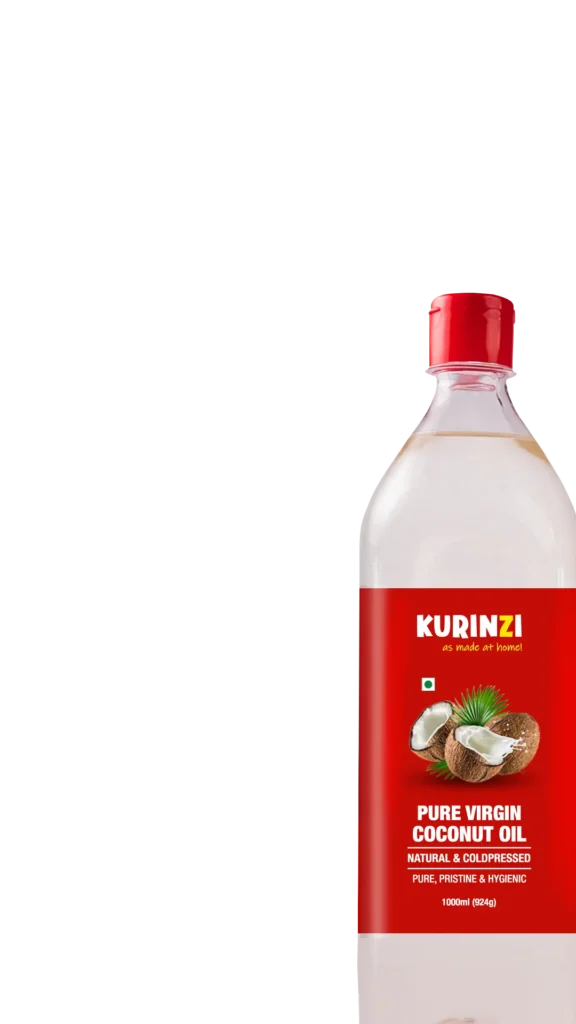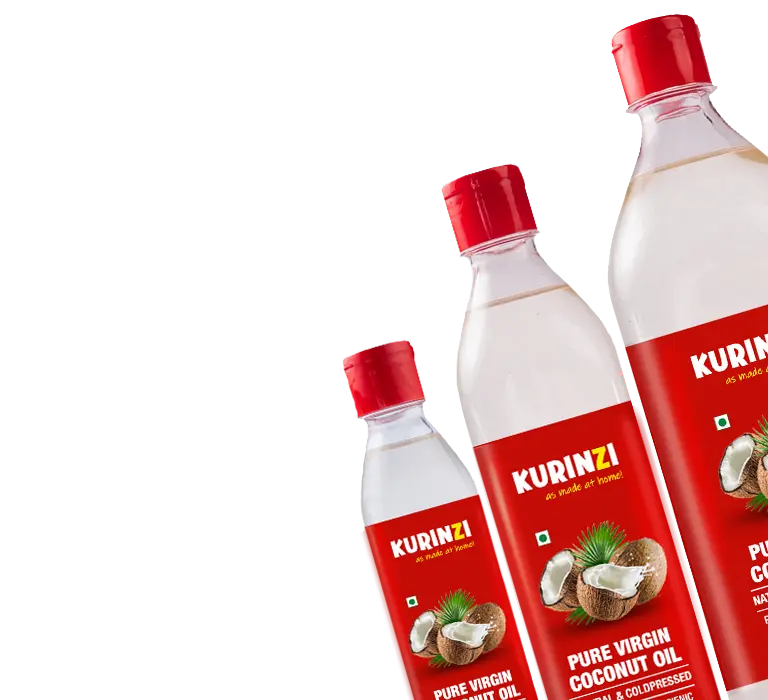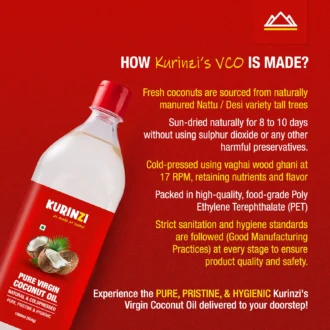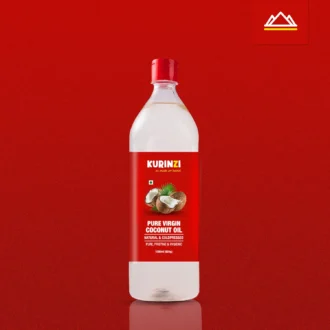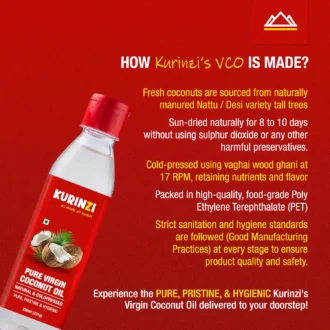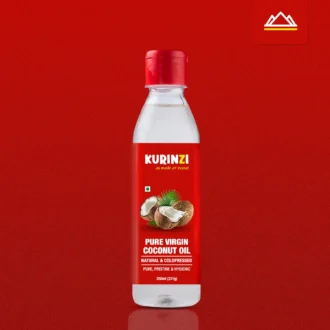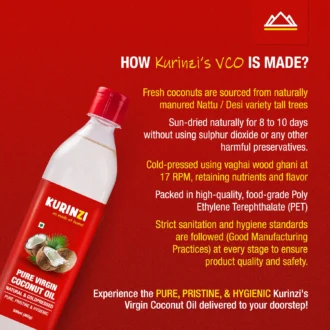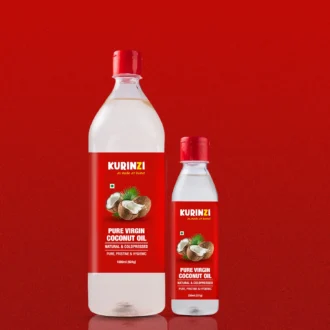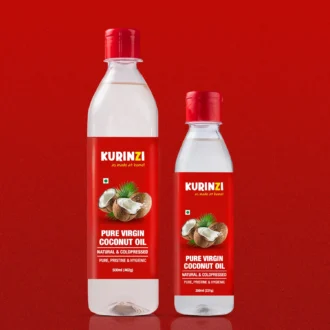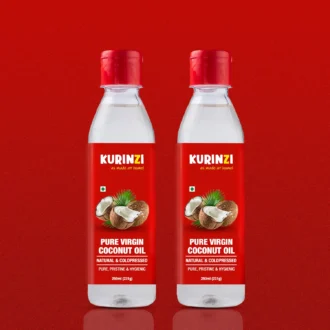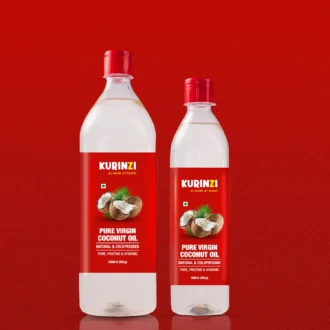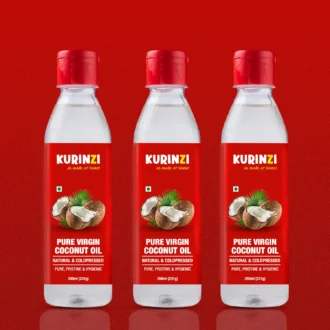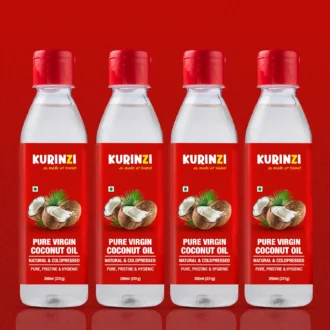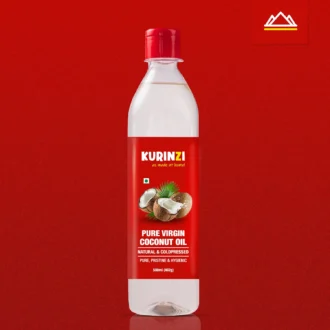WOOD Cold Pressed Virgin Coconut Oil (VCO)
UNREFINED, UNBLEACHED, UNDEODORISED AND 100% PURE, PRISTINE & HYGIENIC!
Kurinzi Virgin Coconut Oil (VCO) is a premium quality oil made from dried copras of handpicked coconuts harvested from naturally manured tall trees. The oil is extracted using traditional cold-wood pressing methods, ensuring the highest quality oil for our customers. Our strict adherence to Good Manufacturing Practice (GMP) guidelines during all stages of processing, handling, storage, and packaging ensures that our customers receive 100% pure and natural virgin coconut oil.
Virgin coconut oil, do we know it at all?
You may have heard of coconut oil before, but what about its virgin counterpart? Virgin coconut oil is a high-quality and unrefined oil that has become increasingly popular due to its many health benefits and versatility. But what exactly is it and how does it differ from regular refined coconut oil that we are accustomed to? This Frequently Asked Questions (FAQ) will provide you with an overview of virgin coconut oil, including its extraction process, quality factors, and benefits. Whether you’re looking to incorporate it into your cooking, beauty routine, or wellness regimen, this guide will help you understand what makes virgin coconut oil a unique and valuable addition to your lifestyle.
What is Virgin Coconut Oil (VCO)?
There is a significant amount of confusion and misinformation surrounding Virgin Coconut Oil, with people strongly believing that only a specific method of oil extraction qualifies as true virgin coconut oil while dismissing others. This ambiguity leads to numerous questions and misunderstandings among consumers, manufacturers, and traders who hold onto their own beliefs without seeking the truth. At Kurinzi, we are an FSSAI licensed virgin coconut oil manufacturer, and we adhere to the standards set forth by the Food Safety and Standards Regulation, 2011. These regulations provide a clear definition and guidelines for Virgin Coconut Oil. As an FSSAI licensed company, our ultimate source of truth lies in the Food Safety and Standards Regulation, 2011.
As per the FSSAI standards,
39[1 (A) Virgin Coconut Oil means the oil expressed from the kernel of Cocos nucifera nuts by mechanical or natural means with or without the application of heat, which does not lead to alteration of the oil and virgin coconut oil is suitable for human consumption in its natural state without refining. It shall be clear and free from rancidity, suspended or other foreign matter, separated water, added colouring or flavouring substances, or mineral oil and it shall conform to the following standards, namely: –

Test for argemone oil shall be negative.
(i) Food Additives not permitted.
(ii) Contaminants, Toxins and Residues: The product shall comply with the Food Safety and Standards (Contaminants, Toxins and Residues) Regulations, 2011
(iii) Hygiene: The products shall be prepared and handled in accordance with the practices prescribed in Schedule 4 of the Food Safety and Standards (Licensing and Registration of Food Businesses) Regulations, 2011 and any other such practices prescribed from time to time under the provisions of the Food Safety and Standard Act, 2006. The product shall conform to the microbiological requirement prescribed in Appendix B
(iv) Labelling: The provisions of the Food Safety and Standards (Packaging and Labelling) Regulations, 2011 shall apply.
(v) Methods of Sampling and Analysis: As provided in the relevant Food Safety and Standards Authority of India Manual of Methods of Analysis of Food.]
Hope this information provides a clear understanding of what constitutes virgin coconut oil. To witness the adherence to quality parameters and compliance, you can view Kurinzi’s Virgin Coconut Oil test report here.
What is the difference between refined coconut oil and virgin coconut oil?
The main difference between refined coconut oil and virgin coconut oil lies in their production methods and the level of processing involved:
- Production Method: Refined coconut oil is typically made from dried coconut meat (copra) that is often subjected to high heat, chemical solvents, or mechanical processes for extraction. In contrast, virgin coconut oil is usually made from fresh coconuts, where the oil is extracted through methods like cold-pressing or expeller-pressing without the use of heat or chemicals.
- Processing: Refined coconut oil undergoes further refining processes, including bleaching and deodorizing, to remove impurities, color, and odor. These processes can alter the taste, aroma, and nutrient content of the oil. On the other hand, virgin coconut oil retains its natural aroma, flavor, and nutrients due to minimal processing.
- Nutrient Content: Virgin coconut oil is considered to be less processed and retains more of the natural nutrients present in coconuts, such as antioxidants, vitamins, and minerals. In contrast, the refining processes used for refined coconut oil may result in a loss of some of these beneficial compounds.
- Flavor and Aroma: Virgin coconut oil has a distinct coconut flavor and aroma, which can enhance the taste of dishes and baked goods. Refined coconut oil, on the other hand, is often flavorless and odorless, making it suitable for recipes where a neutral taste is desired.
Overall, virgin coconut oil is often considered to be a more natural and minimally processed option compared to refined coconut oil, and it is preferred by those seeking the potential health benefits and the characteristic taste and aroma of coconut.
How Virgin Coconut Oil (VCO) is extracted – what are the methods?
Virgin coconut oil can be extracted using various methods, with the goal of obtaining the oil from fresh / sun-dried coconut meat while preserving its natural qualities. Some common methods of extracting virgin coconut oil include:
- Cold-Pressing: This method involves pressing the fresh coconut meat to extract the oil at low temperatures (usually below 120°F or 49°C). Cold-pressing helps retain the natural nutrients, aroma, and flavor of the coconut oil.
- Expeller-Pressing: Similar to cold-pressing, expeller-pressing also involves mechanical extraction of oil from the coconut meat. However, it may involve slightly higher temperatures during the pressing process.
- Centrifuge Extraction: In this method, the grated coconut meat is spun in a centrifuge machine to separate the oil from the coconut milk. The centrifugal force separates the oil, leaving behind the coconut milk.
- Fermentation: This traditional method involves allowing the coconut milk to ferment naturally for a certain period. During fermentation, the oil separates from the coconut milk solids, and it is then extracted manually or through mechanical means.
It is important to note that the method of extraction can affect the quality and nutritional value of the coconut oil. Cold-pressed and centrifuge methods are considered to produce high-quality virgin coconut oil.
What makes the quality of Virgin Coconut Oil?
The quality of VCO can be affected by several factors, including:
- Source of coconuts: The quality of the coconuts used to make VCO plays a significant role. Fresh, mature coconuts grown in nutrient-rich soil without the use of pesticides or chemical fertilizers are preferred for producing high-quality oil.
- Extraction method: The method of extracting the oil can impact its quality. Cold-pressed VCO, obtained through mechanical pressing at low temperatures, is generally considered superior as it preserves the oil’s natural flavor, aroma, and nutrients. Centrifuged oil, obtained through a centrifuge machine, is also widely used but may have slight differences in quality compared to cold-pressed oil.
- Processing: Additional processing or refinement can affect the quality of virgin coconut oil. Unrefined VCO, which undergoes minimal processing, is typically considered of higher quality than refined oil that goes through further processing steps.
- Shelf life: The freshness and shelf life of virgin coconut oil can affect its quality. Freshly made oil is generally of higher quality compared to oil that has been stored for an extended period. It is recommended to use VCO within 6-12 months of its production date to ensure optimal quality.
- Color and scent: High-quality virgin coconut oil typically exhibits a clear, white color and a pleasant, sweet, nutty aroma. Discoloration or the presence of off-putting odors may indicate lower quality.
What are the benefits of virgin coconut oil?
Virgin coconut oil is believed to have a wide range of potential health benefits, including:
- Improving heart health: The medium-chain fatty acids (MCFAs) present in coconut oil, such as lauric acid, may help lower cholesterol levels and improve heart health.
- Boosting the immune system: VCO contains lauric acid, which has antimicrobial and antiviral properties. This can potentially strengthen the immune system and assist in combating infections.
- Promoting healthy skin: The moisturizing and anti-inflammatory properties of VCO may aid in soothing and healing dry, irritated skin. It could also minimize the appearance of fine lines and wrinkles.
- Aiding in weight loss: Research suggests that the medium-chain fatty acids (MCFAs) in virgin coconut oil can increase metabolism and promote weight loss.
- Supporting brain health: The ketones produced by the body when digesting coconut oil can serve as an alternative energy source for the brain, potentially improving cognitive function in some individuals.
- Reducing inflammation: Virgin coconut oil contains antioxidants and anti-inflammatory compounds that may help reduce inflammation throughout the body.
It’s important to note that while there is some evidence to support these potential benefits of VCO, more research is needed to fully understand its effects on human health. Additionally, coconut oil is high in calories and saturated fat, so it should be consumed in moderation as part of a balanced diet.
Overall, high-quality virgin coconut oil should be unrefined, cold-pressed, and made from fresh, mature coconuts grown without the use of chemicals or pesticides. It should also have a clear, white color and a sweet, nutty aroma.
What is MCT in coconut oil and what are the benefits of it?
MCT stands for medium-chain triglycerides, which are a type of fatty acid found in coconut oil. MCTs are metabolized differently than long-chain triglycerides, which are found in many other types of fat. They are rapidly absorbed by the body and quickly converted into ketones, which can be used as an alternative source of energy for the brain and body.
Some potential benefits of consuming MCTs include:
- Supporting weight loss: MCTs have been shown to increase feelings of fullness and boost metabolism, which may aid in weight loss.
- Improving cognitive function: The ketones produced by MCT metabolism may provide an alternative energy source for the brain, improving cognitive function in some individuals.
- Providing sustained energy: MCTs are quickly metabolized by the body and can provide a sustained source of energy throughout the day.
- Reducing inflammation: Some studies suggest that MCTs may have anti-inflammatory properties, which could help reduce inflammation in the body.
Can I use virgin coconut oil for cooking everyday?
Yes, you can use VCO for cooking everyday as it is a healthy oil.
Can I apply virgin coconut oil on hair?
Yes, you can apply VCO on hair as it is known to promote hair growth and nourish the scalp.
Can I apply virgin coconut oil on my face?
Yes, you can apply VCO on your face as it is a natural moisturizer and can help in reducing skin inflammation.
How much virgin coconut oil should I take daily?
The recommended daily intake of VCO varies, but typically ranges from 1-3 tablespoons per day.
What chemicals are in virgin coconut oil?
VCO does not contain any chemicals, as it is extracted using natural methods without the use of chemical solvents.
Why is coconut oil called virgin?
Coconut oil is called virgin when it is extracted from fresh coconuts without the use of any chemicals or high heat.
Why is virgin coconut oil so expensive?
Virgin coconut oil is more expensive than regular coconut oil because of the higher quality of the coconuts used and the more labor-intensive extraction process.
Is virgin coconut oil good or bad fat?
Virgin coconut oil is a good fat as it is a rich source of medium-chain triglycerides (MCTs), which are known to provide a variety of health benefits.
Which is better: virgin coconut oil or olive oil?
Both virgin coconut oil and olive oil have their own health benefits. However, virgin coconut oil is better for cooking at high temperatures, while olive oil is better for low-heat cooking and as a salad dressing.
Is Kurinzi’s Coconut Oil chemical free?
Yes, Kurinzi’s Coconut Oil is chemical-free as it is extracted using traditional cold-wood pressing methods without the use of any chemical solvents.
Is Kurinzi’s coconut oil pure?
Yes, Kurinzi’s coconut oil is 100% pure as it is made from high-quality coconuts harvested from naturally manured tall trees without any adulteration.
Can we drink Kurinzi virgin coconut oil?
Yes, you can drink Kurinzi virgin coconut oil as it is 100% pure, edible, and suitable for both internal and external use.
Is Kurinzi Coconut Oil 100% virgin?
Yes, Kurinzi Coconut Oil is 100% virgin as it is extracted from dried copra using traditional cold-wood pressing methods without the use of any chemical solvents.
It’s important to note that while there is some evidence to support these potential benefits of Virgin Coconut Oil, more research is needed to fully understand their effects on human health. Additionally, as with any dietary supplement, it’s important to speak with a healthcare professional to determine whether Virgin Coconut Oil is a good choice for your individual health needs.

shop now


